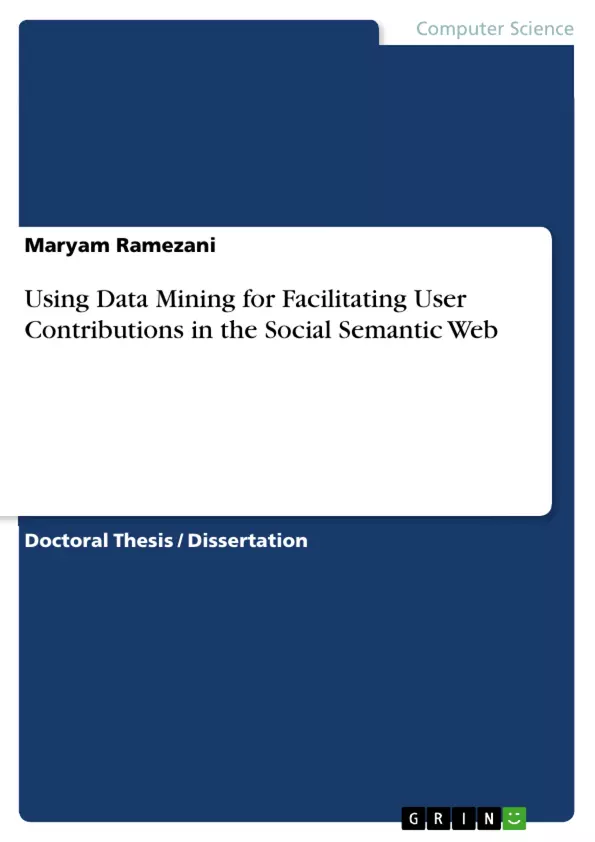Social Web applications have emerged as powerful applications for Internet users allowing them to freely contribute to the Web content, organize and share information, and utilize the collective knowledge of others for discovering new topics, resources and new
friends. While social Web applications such as social tagging systems have many benefits, they also present several challenges due to their open and adaptive nature. The amount of user generated data can be extremely large and since there is not any controlled vocabulary or hierarchy, it can be very difficult for users to find the information that is of their interest.
In addition, attackers may attempt to distort the system’s adaptive behavior by inserting erroneous or misleading annotations, thus altering the way in which information is presented to legitimate users. This thesis utilizes data mining and machine learning techniques to address these problems. In particular, we design and develop recommender systems to aid the user in contributing to the Social Semantic Web. In addition, we study intelligent techniques to
combat attacks against social tagging systems. In our work, we first propose a framework that maps domain properties to recommendation technologies. This framework provides a systematic approach to find the appropriate recommendation technology for addressing a
given problem in a specific domain. Second, we improve existing graph-based approaches for personalized tag recommendation in folksonomies. Third, we develop machine learning algorithms for recommendation of semantic relations to support continuous ontology development in a social semanticWeb environment. Finally, we introduce a framework to analyze different types of potential attacks against social tagging systems and evaluate their impact
on those systems.
Inhaltsverzeichnis (Table of Contents)
- Abstract
- Zusammenfassung
- Acknowledgments
- Chapter 1: Introduction
- 1.1 Social Web Applications
- 1.2 Challenges of Social Web Applications
- 1.3 Research Objectives
- Chapter 2: Related Work
- 2.1 Recommendation Systems
- 2.2 Social Tagging Systems
- 2.3 Ontology Development
- Chapter 3: Framework for Mapping Domain Properties to Recommendation Technologies
- Chapter 4: Improved Graph-Based Approaches for Personalized Tag Recommendation
- Chapter 5: Machine Learning Algorithms for Semantic Relation Recommendation
- Chapter 6: Framework for Analyzing Attacks Against Social Tagging Systems
Zielsetzung und Themenschwerpunkte (Objectives and Key Themes)
This dissertation aims to address the challenges posed by the large volume of user-generated data and the lack of controlled vocabularies in social web applications, particularly social tagging systems. It focuses on utilizing data mining and machine learning techniques to improve user experience and combat malicious attacks.
- Development of recommender systems to facilitate user contributions to the Social Semantic Web.
- Improvement of existing graph-based approaches for personalized tag recommendations.
- Creation of machine learning algorithms for recommending semantic relations to support ontology development.
- Design of a framework for analyzing and evaluating the impact of various attacks on social tagging systems.
- Development of a framework mapping domain properties to appropriate recommendation technologies.
Zusammenfassung der Kapitel (Chapter Summaries)
Chapter 1: Introduction introduces the context of social web applications, highlighting their benefits and challenges. It outlines the research objectives and the scope of the dissertation.
Chapter 2: Related Work reviews existing literature on recommendation systems, social tagging systems, and ontology development, providing a foundation for the research presented in subsequent chapters.
Chapter 3: Framework for Mapping Domain Properties to Recommendation Technologies details a systematic approach for selecting suitable recommendation technologies based on specific domain properties and problem types.
Chapter 4: Improved Graph-Based Approaches for Personalized Tag Recommendation presents enhancements to existing graph-based methods for providing personalized tag recommendations in folksonomies, improving user experience and information retrieval.
Chapter 5: Machine Learning Algorithms for Semantic Relation Recommendation describes the development of machine learning algorithms aimed at improving continuous ontology development within a social semantic web setting.
Chapter 6: Framework for Analyzing Attacks Against Social Tagging Systems introduces a novel framework designed to analyze different types of attacks against social tagging systems, and to evaluate their impact.
Schlüsselwörter (Keywords)
Data mining, machine learning, recommender systems, social semantic web, social tagging systems, ontology development, personalized recommendations, attack analysis, folksonomies, semantic relations.
- Quote paper
- Maryam Ramezani (Author), 2011, Using Data Mining for Facilitating User Contributions in the Social Semantic Web, Munich, GRIN Verlag, https://www.hausarbeiten.de/document/181536


